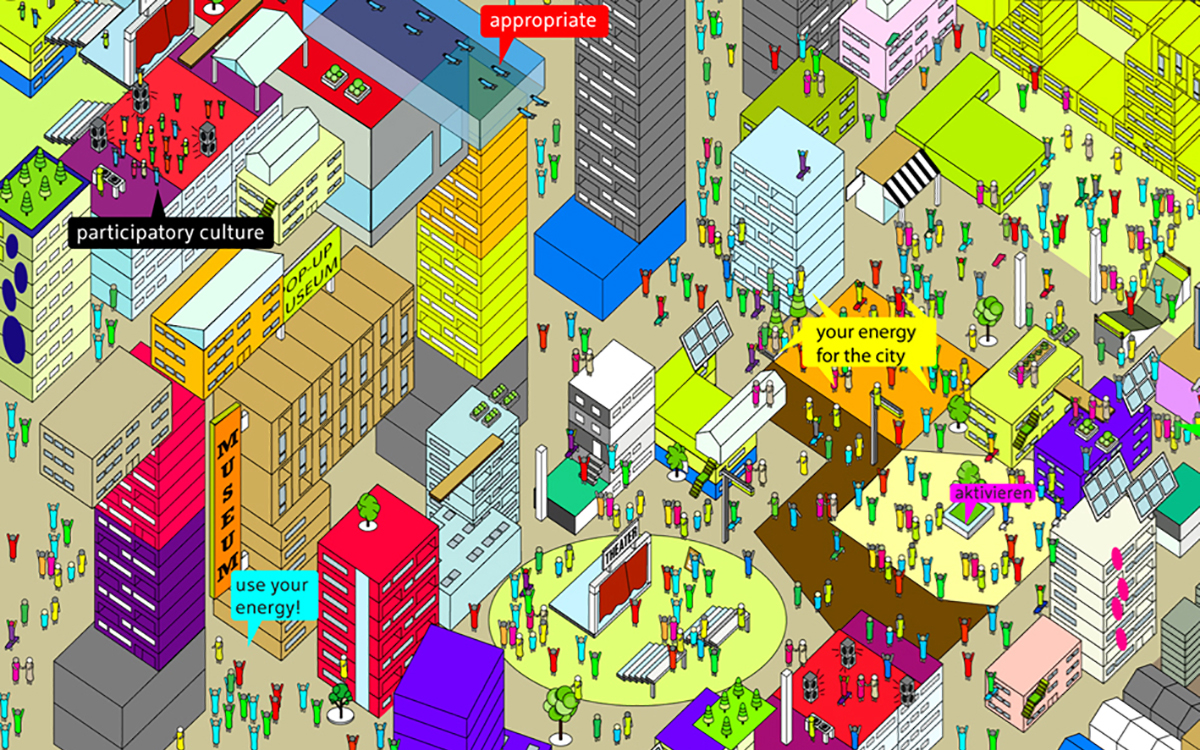What is the relationship between city visions and urban concepts from the past and today’s Smart City narratives?
Lectures & Discussion Visions, Concepts and Narratives for the Networked City @ Humboldt Institute for Internet and Society, Berlin, 20 February 2020
Networked
City
With the increasing digital transformation of cities, information and communication technology (ICT) are ubiquitously pervading the urban, networking cities in manifold ways.
The approach borrowed from information technology aims for data-powered optimization and efficiency of urban functions by supporting collection of data of real-life phenomena; the approach informed by communication technologies, instead, enhances participation of city users and dwellers, cracking processes open, allowing for greater complexity, negotiation and the formation of intelligent creative collectives.
Optimization valuably helps addressing challenges related to sustainability, security and control and urban management at large. However, it still important to question for whom urban processes are optimized and to bear in mind that the qualities of urbanity are based on the functional, social, cultural richness and complexity of cities – and thus also their inherent ongoing negotiations.
Alternative approaches and inputs at play open up room for possibility for shaping urban-tech. It is therefore instrumental to understand, frame and place contemporary, future-geared urban technological visions and models within the history of urbanization and of the development of city concepts.
Social ideals and models underpin and determine corresponding urban visions, and spaces are designed with specific identities of users and dwellers in mind. It is therefore crucial to think inclusively and factor in for the social dimensions involved in such urban technology concepts.
With urban planners, designers, social sciences researchers, futurologists and active citizens reflecting and sharing urban and technological visions and concepts, the relationship between ideas and concepts from the past and urban futures remains to be co-created and collectively processed.
Program
Prof. Elizabeth Sikiaridi and Prof. Frans Vogelaar, Hybrid Space Lab
Benjamin Knödler, der Freitag
Dr. Isabella Hermann, Political Scientist, Berlin-Brandenburg Academy of Sciences and Humanities
Prof. Melanie Humann, Architect, TU Dresden
Elke Plate, Urban Planner, Senate Department for Urban Development and Housing, Project Leader Berlin 2030
Rosa Thoneick, CityScienceLab, HafenCity University Hamburg
“Visions for the Networked City” is introduced by the curators of the City Making Lab program Christian Grauvogel (Humboldt Institute for Internet and Society) and Prof. Elizabeth Sikiaridi and Prof. Frans Vogelaar (Hybrid Space Lab).
* What are the urban models and city concepts shaping urban-tech?
* What is the social and urban history of city technologies and infrastructures?
* How is ongoing digitalization embedded in the historical continuity of the urban?
* Alongside efficiency and optimization, how do other factors affect the quality of our cities and what more is there to it?
* Which social models impact and shape the urbanization of technology?
* What is not addressed by these urban-tech solutions and who is left behind?
* Would human-centered approaches to urban technology promote practices for the self-determination and empowerment of Smart Citizens?

City Making Lab investigates ongoing developments at the intersection of cities and digital technology, engaging with urban mobility and public space, new patterns of space utilization for living and working, circular city, climate adaptation and healthy cities.
City Making Lab aims to bridge the gap between data and privacy experts and urbanists, architects, city makers, civil society and governance.
The leitmotif of City Making Lab – “digital macht stadt” – captures the potential of digital technology to power city development and re-define power in the city.
Visions for the Networked City is part of City Making Lab, a program focusing on digitalization and the city. City Making Lab is a co-operation between Hybrid Space Lab and Alexander von Humboldt Institute for Internet and Society (HIIG).
related NEWS